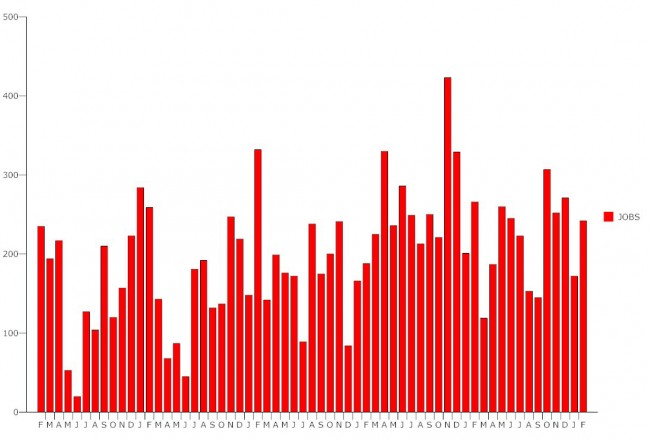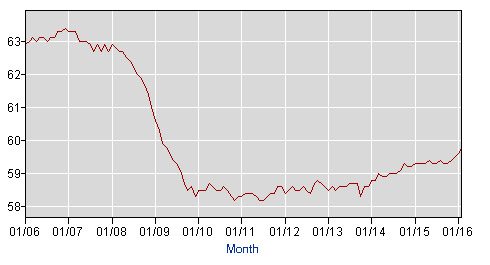
For at least a few moments this morning the nation’s eyes veered away from the wreckage of last night’s Republican debate in Detroit to take in the latest unemployment numbers, historically one of the key factors in deciding presidential elections.
After a relatively weaker January, when only 172,000 jobs were created, the job market resumed the late 1990s-like pace it has maintained for most of the past two years as the economy added 242,000 jobs in February, while December and January figures were revised upward by 30,000 jobs. That brings the total net jobs created in the last three months to 685,000, and total job creation during President Obama’s second term to nearly 8 million.
The unemployment rate remained at 4.9 percent for the second month. The alternative measure of labor utilization, the so-called U-6 measure, which includes those who have abandoned the job market and the under-employed–those who work part-time either because their hours have been cut back or because they can’t find full-time work–fell by two decimal points, to 9.7 percent. That’s an improvement from the 11.4 percent rate a year ago. The U-6 rate is approaching its pre-recession levels. In February, 6 million workers were employed part-time for economic reasons.
And for the first time in Obama’s presidency, two other economic factors that measure the long-term strength of the job market have also improved: The employment-population ratio, which went up two decimal points to 59.8 percent over the month, its highest level since April 2009, and the labor force participation rate, which also went up two decimal points, to 62.9 percent. That rate was in the 66 percent range before the Great Recession. The two rates point to the willingness of workers to rejoin the labor force. But they are also an indication of the growing number of baby boomers who began retiring just before the Great Recession struck. If the two measures show improvement even as those retirements continue, it would indicate a net strengthening of the labor market.
Another underlying economic factor is not improving as strongly: In February, average hourly earnings for all employees on private
payrolls declined by 3 cents to $25.35, following an increase of 12 cents in January. Average hourly earnings have risen by only 2.2 percent over the year, not enough to overcome inflation or increasing health care costs. The average workweek also declined by 0.2 hours, to 34.4 hours, though that’s not much different than pre-recession levels.
Some highlights by sector: Health care and social assistance added 57,000 jobs in February, retail added 55,000, restaurants and bars added 40,000, private educational services added 28,000, and construction 19,000. Mining lost 19,000 jobs. Since a recent peak in September 2014, mining has shed 171,000 jobs, with more than three-fourths of the loss in support activities for mining. Employment in other major industries, including manufacturing, wholesale trade, transportation and warehousing, financial activities, professional
and business services, and government, showed little change over the month.






























Geezer says
Good Heavens! Everybody run (don’t walk) to your nearest minimum wage employer
for an unfulfilling carreer with no bennies. The economy is BOOMING again, yet
all of us little people are broke.
An epitaph that plays on the back of my eyelids: “Here lies the American Working Man —
the backbone of this great nation, only to be felled by a heart attack caused by no
affordable healthcare, NAFTA, and the 1%. Hillary, grab a shovel.”
Sweep that floor now, and there’s a spill waiting in aisle 6.
Rejoice, unemployment is at 4.9%. Smile as you pass out.
Freddy says
I bet a lot of them are saying “you want fries with that?”
Obama 2016 says
Dam that Obamacare!! 57,000 more jobs created.. I thought it was going to kill job growth.
Sherry says
While our horrific governor has NOT delivered the high paying jobs he promised and promised and promised. . . the MYTH that Obama Care”s” health care program is going to reduce the number of jobs has been completely dispelled! This from Bloomberg:
More than 90 new health-care companies employing as many as 6,200 people have been created in the U.S. since Obamacare became law, a level of entrepreneurial activity that participants say may be unprecedented for the industry.
Zenefits, which provides human-resources software and acts as a health-insurance broker for small employers, wouldn’t exist without the law, said Parker Conrad, the firm’s chief executive officer. Since the Affordable Care Act’s inception in April 2013, the San Francisco-based company has grown to more than 900 employees. That makes it the largest firm among dozens that have sprouted in the law’s wake, according to PricewaterhouseCoopers, which issued a report on the trend this week.
The health law, which took full effect in 2014, represents the most dramatic change to the U.S. health system in 50 years. Entrepreneurs, including some from within President Barack Obama’s administration, have founded companies that target employers, health insurers, hospitals, doctors and consumers looking to navigate new requirements and possibilities.
“There’s a lot of opportunity for new market entrants,” Zenefits’ Conrad said. “The ground is literally shifting under the feet of the incumbents.” Conrad, a cancer survivor, said that after reading the Affordable Care Act cover-to-cover and talking to insurance experts, he realized it offered an opportunity to ease the process of pricing, selling and managing health insurance for small businesses. Zenefits, which has 10,000 clients, can “spit out pricing” for every health insurance plan in a state “in milliseconds,” using only the ages and addresses of employees, he said.
Law’s Opponents
Opponents of the Affordable Care Act have continually warned of the law’s potential effect on U.S. jobs, with Republican John Boehner of Ohio, the House Speaker, frequently calling it “the president’s job-killing health-care law.” The American Action Forum, a nonprofit advocacy group that opposes the law, has blamed it for reducing pay at businesses with 20 to 99 employees by about $22.6 billion annually.
Still, the act became law just as the nation’s employment figures began to improve. On March 6, the Bureau of Labor Statistics reported that the U.S. added 295,000 jobs in February and the unemployment rate fell to 5.5 percent, the lowest level in about seven years. The economy has added at least 200,000 jobs for 12 straight months, the best run since a 19-month stretch that ended in March 1995.
“The claim that the Affordable Care Act is a job-killer is just factually untrue,” said Bob Kocher, a doctor and former Obama adviser who is now a partner at New York-based venture capital firm Venrock Associates.
‘Enormous Opportunity’
The law has “created the most enormous opportunity to build health-care companies ever,” Kocher said.
His firm has invested in eight such startups, including a Bethesda, Maryland-based company started last year by another former Obama administration official, Farzad Mostashari. His company, Aledade assists doctors looking to take advantage of a program in the health-care law that offers higher payments under Medicare, the insurance plan for the elderly and disabled, if they can reduce the cost of caring for those patients without harming their health.